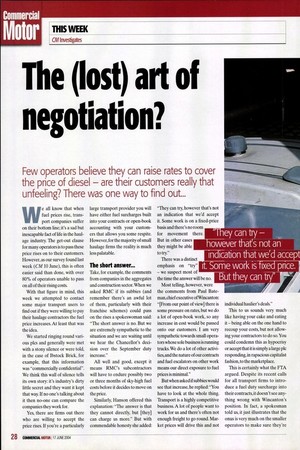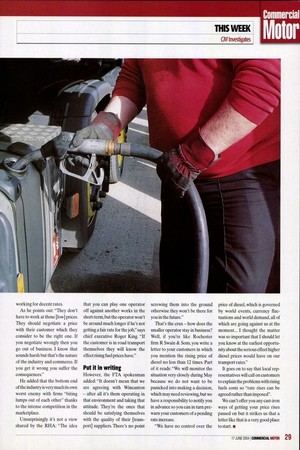The (lost) art of
Page 26

Page 27

If you've noticed an error in this article please click here to report it so we can fix it.
negotiation? Few operators believe they can raise rates to cover the price of diesel — are their customers really that
unfeeling? There was one way to find out..
We all know that when fuel prices rise, transport companies suffer on their bottom line; it's a sad but inescapable fact of life in the haulage industry. The get-out clause for many operators is to pass these price rises on to their customers. However, as our survey found last week (CM 10 June), this is often easier said than done, with over 80% of operators unable to pass on all of their rising costs.
We all know that when fuel prices rise, transport companies suffer on their bottom line; it's a sad but inescapable fact of life in the haulage industry. The get-out clause for many operators is to pass these price rises on to their customers. However, as our survey found last week (CM 10 June), this is often easier said than done, with over 80% of operators unable to pass on all of their rising costs.
We all know that when fuel prices rise, transport companies suffer on their bottom line; it's a sad but inescapable fact of life in the haulage industry. The get-out clause for many operators is to pass these price rises on to their customers. However, as our survey found last week (CM 10 June), this is often easier said than done, with over 80% of operators unable to pass on all of their rising costs.
With that figure in mind, this week we attempted to contact some major transport users to find out if they were willing to pay their haulage contractors the fuel price increases. At least that was the idea.
We started ringing round various plcs and generally were met with a stony silence or were told, in the case of Ibstock Brick, for example, that this information was "commercially confidential". We think this wall of silence tells its own story: it's industry's dirty little secret and they want it kept that way. If no one's talking about it then no-one can compare the companies they work for. Yes, there are firms out there who are willing to accept the price rises. If you're a particularly
large transport provider you will have either fuel surcharges built into your contracts or open-book accounting with your customers that allows you some respite. However, for the majority of small haulage firms the reality is much less palatable.
The short answer...
Take, for example, the comments from companies in the aggregates and construction sector. When we asked RMC if its subbies (and remember there's an awful lot of them, particularly with their franchise schemes) could pass on the rises a spokeswoman said: "The short answer is no. But we are extremely sympathetic to the situation and we are waiting until we hear the Chancellor's decision over the September duty increase."
All well and good, except it means RMC's subcontractors will have to endure possibly two or three months of sky-high fuel costs before it decides to move on the price. Similarly, Hanson offered this explanation: "The answer is that they cannot directly, but [they] can charge us more." But with commendable honesty she added:
"They can try, however that's not an indication that we'd accept it. Some work is on a fixed-price basis and there's no room for movement there. But in other cases they might be able to try."
"They can try, however that's not an indication that we'd accept it. Some work is on a fixed-price basis and there's no room for movement there. But in other cases they might be able to try."
"They can try, however that's not an indication that we'd accept it. Some work is on a fixed-price basis and there's no room for movement there. But in other cases they might be able to try."
There was a distinct emphasis on "try" — we suspect most of the time the answer will be no.
There was a distinct emphasis on "try" — we suspect most of the time the answer will be no.
Most telling, however, were the comments from Paul Bateman,chief executive ofWmcanton: "[From our point of view] there is some pressure on rates, but we do a lot of open-book work, so any increase in cost would be passed onto our customers. I am very sympathetic towards small operators whose sole business is running trucks. We do a lot of other activities,and the nature of our contracts and fuel escalators on other work means our direct exposure to fuel prices is minimal." But when asked if subbies would see that increase, he replied: "You have to look at the whole thing. Transport is a highly competitive business. A lot of people want to work for us and there's often not enough freight to go round. Market prices will drive this and not
individual haulier's deals."
This to us sounds very much like having your cake and eating it — being able on the one hand to recoup your costs, but not allowing your contractors to do so. You could condemn this as hypocrisy or accept that it is simply a large plc responding, in rapacious capitalist fashion, to the marketplace. This is certainly what the FTA argued. Despite its recent calls for all transport firms to introduce a fuel duty surcharge into their contracts, it doesn't see anything wrong with Wincanton's position. In fact, a spokesman told us, it just illustrates that the onus is very much on the smaller operators to make sure they're
working for decent rates.
As he points out: "They don't have to work at those [low] prices. They should negotiate a price with their customer which they consider to be the right one. If you negotiate wrongly then you go out of business. I know that sounds harsh but that's the nature of the industry and commerce. If you get it wrong you suffer the consequences."
He added that the bottom end of the industry is very much its own worst enemy with firms "biting lumps out of each other" thanks to the intense competition in the marketplace. Unsurprisingly it's not a view shared by the RHA: "The idea
that you can play one operator off against another works in the short-term, but the operator won't be around much longer if he's not getting a fair rate for the job," says chief executive Roger King. "If the customer is in road transport themselves they will know the effect rising fuel prices have." Put it in writing Put it in writing However, the FTA spokesman added: "It doesn't mean that we are agreeing with Wincanton — after all it's them operating in that environment and taking that attitude. They're the ones that should be satisfying themselves with the quality of their [transport] suppliers. There's no point
screwing them into the ground otherwise they won't be there for you in the future."
That's the crux — how does the smaller operator stay in business? Well, if you're like Rochester firm R Swain & Sons, you write a letter to your customers in which you mention the rising price of diesel no less than 12 times. Part of it reads: "We will monitor the situation very closely during May because we do not want to be panicked into making a decision, which may need reviewing, but we have a responsibility to notify you in advance so you can in turn prewarn your customers of a pending rate increase. "We have no control over the
price of diesel, which is governed by world events, currency fluctuations and world demand, all of which are going against us at the moment... I thought the matter was so important that I should let you know at the earliest opportunity about the serious effect higher diesel prices would have on our transport rates."
It goes on to say that local representatives will call on customers to explain the problems with rising fuels costs so "rate rises can be agreed rather than imposed". We can't offer you any cast-iron ways of getting your price rises passed on but it strikes us that a letter like that is a very good place to start. w




























































































































































































